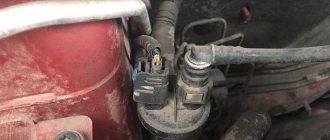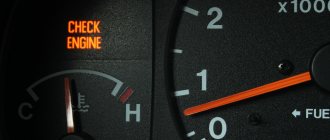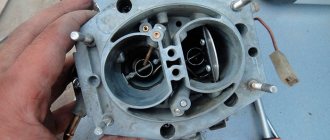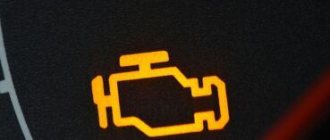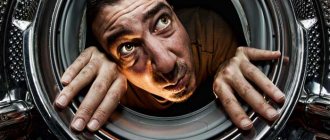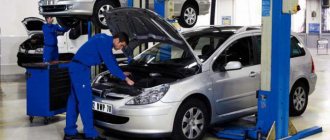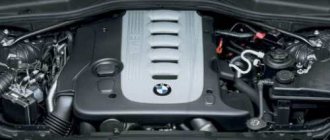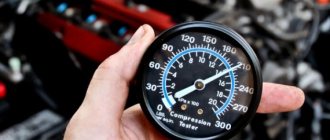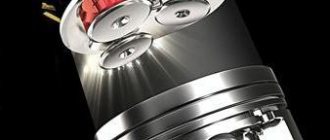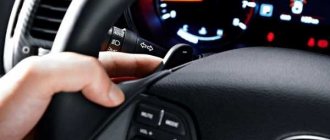Smooth acceleration is important for the comfort of a car ride. When your car jerks when accelerating, this indicates some kind of technical problem or damage. Today we'll tell you why your car may jerk when accelerating and what you can do to fix the problem.
To make it easier to detect the problem, you need to take into account the nature of the twitching. Does your car shake when you press the gas pedal hard? Check the mass air flow sensor. Do you feel like your car is lacking power? Dirty injectors may be the culprit. Let's take a quick look at the reasons why a car jerks when accelerating.
Bad spark plugs and/or coils
Sharp jerks during acceleration can occur when something is wrong with the fuel ignition. A faulty spark plug or failed ignition coil will cause misfire in one of the cylinders. This may cause slight jerking, especially when you are trying to accelerate.
In addition, unstable idling will be additional confirmation of problems with the spark plug or coil.
Why does the car jerk when accelerating?
All passenger cars with gasoline engines in use today are equipped with either injection or carburetor power units. The second type of internal combustion engine is now considered almost “rare”, but in Russia (especially in the provinces) there is still quite a lot of such equipment “on the move”. Therefore, considering the possible reasons why passenger cars can jerk and accelerate jerkily, it makes sense to start with them.
Carburetor engines
These power units, compared to more modern, injection ones, are simpler in design, all their “weak points” have been well studied, and therefore it is not so difficult to find the reason for their unstable operation at the stage of starting and accelerating the car. Experienced engine specialists with knowledge of the matter claim that cars with carburetor engines most often jerk due to problems such as:
- Dirty fuel or air filter;
- Problems with the fuel pump;
- Malfunction of the fuel pressure regulator.
Thus, those owners of cars with carburetor engines whose cars began to twitch when starting the engine and accelerating should, first of all, check exactly those parts, components and assemblies that are listed above.
If it turns out that everything is in order with them, then you need to pay close attention to the ignition system. In carburetor engines, its malfunctions are also often the cause of jerking. Practice shows that in cases where, when you press the accelerator pedal, the car refuses to accelerate (as drivers say in their professional slang, it “fails”), it makes sense to thoroughly check the ignition coil, as well as the high-voltage wires connected to it.
In fact, it often turns out that these parts begin to “punch through”, and therefore the engine “troubles”. The solution to the problem in this case is to replace the faulty part.
Another fairly common problem is banal carbon deposits in candles. It leads to the fact that the spark does not occur when it should (and sometimes does not occur at all), which leads to jerks during acceleration. The way out of this situation is to clean or replace the spark plugs.
Injection engines
Gasoline power units of this type have significantly better operational and technical characteristics than carburetor units, but their design is much more complex. Accordingly, there are much more reasons why a car may jerk during acceleration.
The main feature of an injection engine is that a special electronic unit regulates the flow of the fuel mixture into its combustion chambers. Several sensors are involved in this process, namely:
- Throttle position;
- Mass air flow;
- Crankshaft positions.
A malfunction of any of them may cause the car to jerk when starting the engine and accelerating. It is interesting that if serious problems arise with the crankshaft position sensor, the injection system is often turned off completely, and then it is impossible to start the engine at all.
It goes without saying that the reasons for jerking during acceleration of cars equipped with injection engines can be the same as for carburetor engines, that is, clogged filters, problems with spark plugs, ignition coils and high-voltage wires, as well as fuel system elements (including and clogged fuel injectors).
It should also be noted that one of the common reasons for a car to jerk when starting the engine and accelerating is the use of low-quality fuel. As a result, a lean fuel mixture is formed, and the engine begins to operate very unstable, in particular, jerks appear during acceleration. This applies equally to both carburetor and injection power units.
Dirty throttle
Jerking when accelerating can also occur if the throttle valve is dirty. The car will lack power and may stall after you press the gas pedal once and then let it idle. You can use special products from auto stores to clean the throttle body, but be careful. Excessive throttle body cleaning in older vehicles can result in high engine idle speed due to wear on the throttle body. Sometimes minor repairs to this unit may be required.
Conclusion
If the car jerks during acceleration or when driving at low speeds, the reasons may be defects in the fuel system, engine, gearbox, ignition or other components. To understand which systems require repair, you need to pay attention to the nature of the twitching, intensity and accompanying symptoms. To accurately determine the problem, it is advisable to carry out diagnostics in a workshop, especially if the owner does not have experience in repairing the car with his own hands or does not have the necessary tools.
The mass air flow sensor (MAF) is faulty
If the MAF sensor sends incorrect information to the ECU, the air/fuel mixture may not be ok. It will either be too rich or too lean, causing the car to stall, jerk, shake and generally irritate the driver. The mass air flow sensor can be cleaned, but it usually requires replacement if such failures occur.
Resolving identified problems
Once the cause has been identified, you can begin to eliminate it. In most cases, this work should be entrusted to specialists. After all, the reasons that at first glance were key are not always exactly what they are. Correct ignition tuning, carburetor adjustment, injector adjustment is something that is best entrusted to a knowledgeable person. If it was determined that the jerking was caused by dirty filters, then you can use an aerosol cleaner. It is sprayed into the air filter hole. Fuel tank additives also perform quite well. These additives clean the fuel line pipes and all other elements. XADO additives have proven themselves well.
Dead catalyst
If the air-fuel mixture is too rich, it can cause the catalytic converter to fail because all the fuel is not burned in the chambers and ends up in the exhaust system and then ignites there. After just a short period of such operation, the catalyst will be blocked, and this will cause the car to jerk when accelerating due to poor air flow in the exhaust system. Cleaning the catalyst is possible, but in most cases it will need to be replaced.
What to do if the car jerks when accelerating?
In order to accurately diagnose the cause of unstable operation of a gasoline internal combustion engine, expressed in jerking during startup and acceleration, first of all, you need to make sure that high-quality fuel is used. It is necessary to check its density and octane number (the corresponding devices are now sold in specialized stores and are quite inexpensive). If it turns out that the cause of jerks during acceleration is precisely poor fuel, then it simply does not need to be used.
It is also necessary to check the air and fuel filters. The fact that they are dirty is usually visible to the naked eye. The way to fix the problem is to replace these consumables with new ones.
To check the spark plugs, you simply need to remove them and subject them to visual inspection. If it turns out that there is carbon deposits on them, then it should be removed or simply replace the spark plugs with new ones. As for coils and high-voltage wires, the most common cause of their malfunction is oxidation of the contacts. To identify it, the easiest way is to use a multimeter and “ring” the circuit. Faulty ignition coils and high-voltage wires should not be repaired, but replaced entirely with new ones.
As for sensors in injection engines, a conventional oscilloscope is used to check them. If this component is working properly, pulses are displayed on the screen indicating the operation of the injector. In cases where there are none or they are of irregular shape, the sensors should be replaced with new ones.
Dying fuel pump
Another part that can cause your car to jerk when accelerating is the fuel pump. If it is about to die, it may not be providing the optimal level of pressure to the fuel injection system. This will result in insufficient fuel delivery and jerking.
Diagnostics at the service center
Diagnostics can also be done at a service center. Especially if the car is fuel-injected, a special device is needed. It is connected to the control unit and shows where and on which sensor the problem is possible. The same goes for diesel cars. To check diesel engine injectors, you need a special stand. Without it, it is impossible to determine what condition they are in.
What to check first
Experienced drivers know that the ignition system should be checked first. It includes spark plugs, armored wires and an ignition coil.
Malfunction in the ignition system
First, you need to check the spark plugs. Soot on the spark plugs leads to misfire, but it will also help determine the quality of gasoline. Namely, the appearance of a white coating or carbon deposits on the electrodes indicates low-quality fuel. The spark plugs, of course, can be cleaned, but it’s better to buy new ones. Fuel must be changed and refueled only at proven gas stations.
Secondly, it is necessary to check the high-voltage wires (armored wires). They transmit electrical impulses from the ignition coil to the electrodes of the spark plugs to ignite the air-fuel mixture. A breakdown is easy to detect with the naked eye. This is done like this: turn on the engine, inspect the wires in the dark, if they spark, then there is undoubtedly a breakdown. If there is a breakdown of the armored wires, they most likely need to be replaced.
Thirdly, an incorrectly set ignition may be the cause of the power unit “jerking” during acceleration. Thus, the list of faults includes the ignition distributor, switch, slider or distributor cap.
The appearance of jerking in the car when you sharply press the gas
If the cause is not related to the fuel pump, then these symptoms may indicate the so-called “triple” of the engine. A situation arises in a car in which out of 4 cylinders only one can work correctly. As a result of the “triple”, the engine simply cannot respond in time to pressing the gas pedal, after which similar problems arise. You can deal with the breakdown in the following ways:
- If the oxygen supply sensor is not working properly, the system is diagnosed using a multimeter. If any faults are found, it is simply replaced.
- If the valve timing in the engine is shifted, it is necessary, with the help of car service specialists, to adjust them according to the appropriate instructions.
- Detection of an incorrect glow number of spark plugs is resolved by installing a new set with the correct number.
- The problem of clogged injectors can only be solved at a car service center. To do this, they are installed on a special stand, which simulates the operation of a motor, and washed with a special solvent.
- The problem can also arise if the emulsion tube and well located in the design of the second chamber of the carburetor engine are clogged. The only solution here is to flush the carburetor and pipe with kerosene.
Problems with powertrain control calibrations
Very often, a breakdown of any sensor, ignition module, is displayed by a message on the instrument panel. However, there are exceptions when all mechanisms operate normally. There seem to be no malfunctions, but the engine still jerks when reaching speed. In this case, incorrect ECU calibration is to blame.
By the way, such symptoms do not always appear. Most often this happens when the engine is not warmed up enough. I had to observe when a cold engine experienced failures during acceleration. The reason for this behavior was the insufficient supply of fuel to the cylinders.
The way out of the situation is to update the software, which will not contain errors and will work without failures. As for the rest of those involved in acceleration jerks, not counting the injectors that have worn out over time and the faulty module, everything is fixable and does not pose a serious threat. It is important to promptly identify such a problem and eliminate it.
If we talk about turbocharged engines, jerks when the car moves are caused by the turbine itself. The weak point of the part is the pressure adjustment system, namely the electric drive, the electromagnetic valve element. The problem disappears after replacing the valve. Another question is when you have to completely change the turbine.

